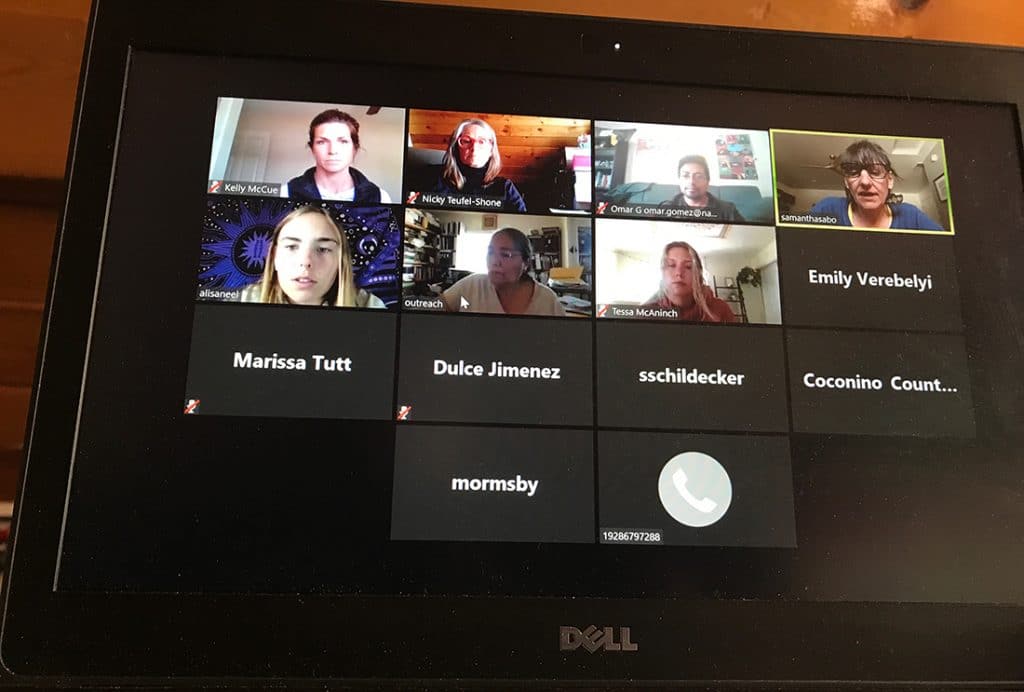As the novel coronavirus spread throughout Arizona, a group of about 15 Northern Arizona University faculty members from a variety of departments and students joined together to help Coconino County Health & Human Services (CCHHS) in its initial response.
The volunteers, most of whom came from the Center for Health Equity Research (CHER), are assisting the county with investigating cases, contacting exposed individuals to discuss quarantine, calling people with negative test results and analyzing the burden county health systems can expect.
“We were interested in making a difference in our community, so we reached out to the county to see how we could help,” said Samantha Sabo, associate professor in the Department of Health Sciences and CHER.
The volunteers formed two teams based on their specializations. The epidemiology team includes Ricky Camplain, assistant professor for the Department of Health Sciences and CHER, Meghan Warren, professor in the Department of Physical Therapy and Athletic Training, Joe Mihaljevec, assistant professor in the School of Informatics, Computing and Cyber Systems, Brettania O’Connor, assistant clinical professor in the Department of Health Sciences, and Crystal Hepp, assistant professor with NAU’s School of Informatics, Computing and Cyber Systems and an affiliate researcher with NAU’s Pathogen and Microbiome Institute.
The disease investigation team includes Sabo, Nicky Teufel-Shone, professor in Health Sciences and associate director of CHER, Carol Goldtooth, community health educator for NAU’s Native American Cancer Prevention, Dulce Jimenez and Marissa Tutt, program coordinators for CHER, Omar Gomez, graduate research assistant at CHER, and Alisa Neel and Tessa McAninch, undergraduate students in public health.
The disease investigation team is helping with the county call center, which is open from 8 a.m. to 9 p.m. during the week and from 9 a.m. to 4 p.m. on weekends. The volunteers all have extensive experience with qualitative research, most are trained in epidemiology and biostatistics, and several speak either Spanish or Navajo.
Sabo said the NAU volunteers are working closely with Dr. Marie Peoples, COVID-19 incident commander and CCHHS manager, Matt Maurer, lead epidemiologist for the COVID-19 team, and Sarah Schildecker, division manager at Coconino County Public Health Services.
“We at the Center for Health Equity Research admire the incredible professionalism and humanity the Coconino County COVID-19 response team brings to the protection of our public’s health,” Sabo said. “Each day, our NAU public health professionals—including faculty, staff and students—learn in earnest of the collective and tireless effort it requires to contain a community infection of this magnitude and to support our community members affected by this outbreak.”
Peoples said the support from CHER has been instrumental in sharing the increased demand on their public health team.
“The Center for Health Equity Research at NAU has become an invaluable partner in Coconino County’s response to the spread of COVID-19. As our epidemiologists and public health team have worked diligently to track the spread of this illness in our community, CHER has provided critically important additional staff to support in disease investigation and data management,” Peoples said. “Additionally, CHER has agreed to support the county’s efforts to utilize forecasting to establish a better understanding of the mid-range and long-range impacts that COVID-19 might have on our community and to develop a thorough planning document for our response.”
SICCS volunteers worked with the county to create a secured system in which volunteers can help Coconino County public health experts conduct disease investigation without being exposed to COVID-19.
“They made it possible for NAU volunteers to contribute to a primary public health goal of disease surveillance from the safety of our own homes,” Sabo said.
Sabo said the teams encourage everyone to protect “frontline public health workers” by staying home, checking on older family members or neighbors and donating resources or skills to help the community.
“Now is a good time for people to see how they can make a difference in their community,” Sabo said.
If you have questions about COVID-19, visit Coconino County’s website, call (928) 679-7300 or email COVID19Information@coconino.az.gov.
Lisa Dahm | Center for Health Equity Research




